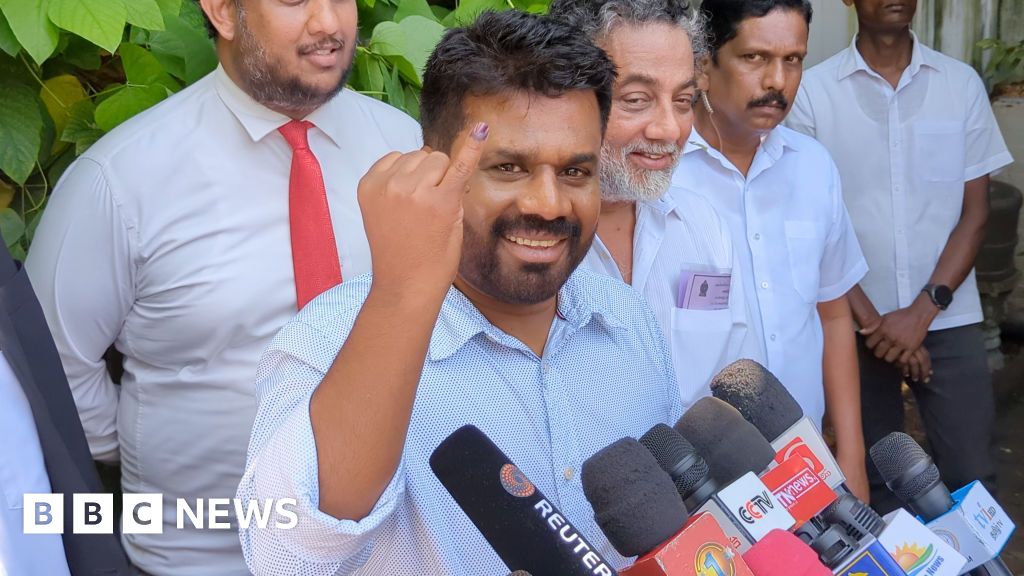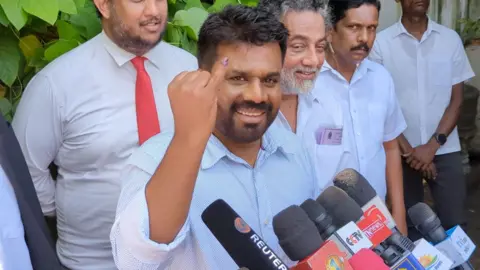 Getty Images
Getty ImagesUnder normal circumstances, the victory of Anura Kumara Dissanayake in Sri Lanka’s presidential election would have been called a political earthquake.
But with many having labelled the left-leaning politician as a strong frontrunner in the run-up to the poll, his win was not a massive surprise for Sri Lankans.
The 55-year-old Dissanayake heads the National People’s Power (NPP) alliance, which includes his Janatha Vimukthi Peramuna (JVP), or People’s Liberation Front – a party that has traditionally backed strong state intervention and lower taxes, and campaigned for leftist economic policies.
With his win, the island will see for the first time a government headed by a leader with a strong left-wing ideology.
“It’s a vote for a change,” Harini Amarasuriya, a senior NPP leader and MP, told the BBC.
“The result is a confirmation of what we have been campaigning for – like a drastic change from the existing political culture and the anti-corruption drive.”
The outsider
Dissanayake is expected to dissolve parliament and call parliamentary elections soon.
It will be a challenge, however, for him to implement his coalition policies in a country that has adopted liberalisation and free-market principles from the late 1970s.
The resounding victory of the NPP came following a wave of public anger over the devastating economic crisis in 2022, when Sri Lanka ground to a halt as inflation surged and its foreign reserves emptied.
The country was unable to pay for imports of food, fuel and medicines and declared bankruptcy.
An unprecedented public uprising against the government’s handling of the economy forced then president Gotabaya Rajapaksa to flee the country in July 2022.
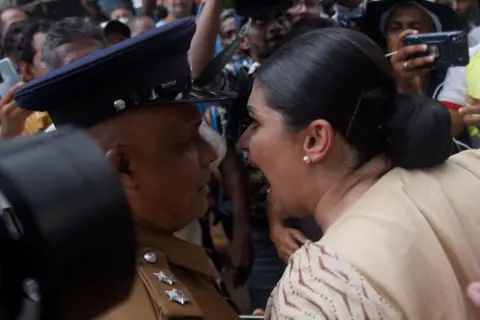 Getty Images
Getty ImagesTwo months earlier, his elder brother and veteran leader Mahinda had been forced to resign as prime minister during the initial phase of the protest, known as “aragalaya” (struggle) in Sinhala.
Ranil Wickremesinghe took over as president with the backing of the Rajapaksas’ party. He stabilised the economy and negotiated a $2.9bn bailout package with the International Monetary Fund (IMF).
For the millions of Sri Lankans who took to the streets, the political change was nothing but a transfer of power between established parties and political dynasties.
The NPP and Dissanayake capitalised on this sentiment, as many in the country saw him as someone outside the old order.
Though he was a minister briefly when the JVP became part of a coalition government during the presidency of Chandrika Kumaratunga in the early 2000s, Dissanayake’s supporters say he is not tainted by corruption or cronyism charges.
The question is how his presidency will tackle Sri Lanka’s massive economic challenges.
During his campaign he promised to lower taxes and utility bills. That means lower revenue for the government, and will go against some of the conditions set by the IMF loan.
“We will work within the broad agreement that the IMF has reached within the current government,” said Amarasuriya from the NPP. “But we will negotiate certain details, particularly regarding the austerity measures.”
A history of violence
The election win is a remarkable turnaround for Dissanayake, who received just over 3% of votes in the 2019 presidential poll.
But while he may have convinced a large section of voters this time, there are concerns over the political ideology of Dissanayake and his JVP, which is remembered for insurrections that led to the deaths of tens of thousands of people in the late 1980s.
From 1987, the JVP spearheaded an armed revolt against the Sri Lankan government in what would come to be known as the “season of terror”.
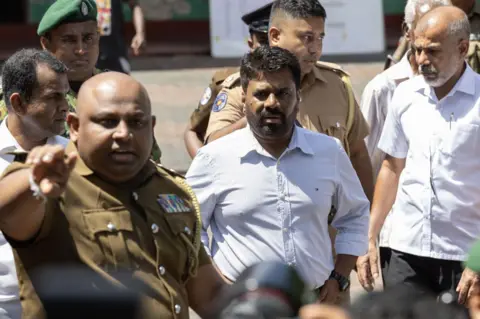 Getty Images
Getty ImagesThe insurrectionist campaign, spurred by discontent among the youth of the rural lower and middle classes, precipitated a conflict marked by raids, assassinations and attacks against both political opponents and civilians.
Dissanayake, who was elected to the JVP’s central committee in 1997 and became its leader in 2008, has since apologised for the party’s violence. But his victory at the polls raises questions as to what role the JVP might play in Sri Lankan politics going forward.
“The JVP has a history of violence and there are concerns about the party’s position in a new government,” said Bhavani Fonseka, a senior researcher with the Centre for Policy Alternatives (CPA) in Colombo.
“I think Mr Dissanayake has softened the radical messaging during his public outreach. My question is, while he may have softened, what about the old guard of the JVP? Where do they situate themselves in a new government?”
Tamil concerns
Another challenge for Dissanayake will be to reach out to the country’s Tamil minority, who have been seeking devolution of powers to the north and east and reconciliation since the end of a civil war in May 2009.
That conflict, between the Tamil Tiger rebels and the Sri Lankan state, erupted in 1983. The Tigers eventually had vast areas under their control in their fight for an independent territory in the island’s north and east, but were defeated and all but wiped out in a 2009 military offensive.
Fifteen years later, the Sri Lankan government’s promises to share power and devolve their own political authority in Tamil-majority areas have largely failed to materialise.
Though the votes for the NPP have increased in the north and the east, Tamils did not vote for Dissanayake overwhelmingly, reflecting concerns over the NPP’s policy towards their political demands.
The UN Human Rights Commissioner’s office in Geneva has urged the new government to pursue an inclusive national vision for Sri Lanka that addresses the root causes of the ethnic conflict.
The government “should undertake the fundamental constitutional and institutional reforms needed to strengthen democracy and the devolution of political authority and to advance accountability and reconciliation,” it said in its latest report.
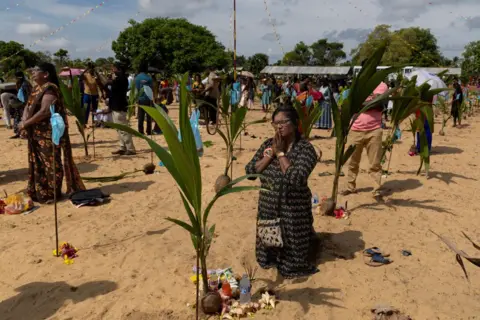 Getty Images
Getty ImagesTigers and dragons
It’s not just about domestic policies, either. The rise of the NPP and JVP is being keenly watched in India and China, which are vying for influence in Sri Lanka. Both have loaned billions of dollars to Colombo.
Dissanayake, with his Marxist leanings, is seen as ideologically closer to China. The JVP in the past had been critical of India’s policy towards Sri Lanka and opposed what it called Indian expansionism.
During his campaign speech Dissanayake also promised to scrap a wind power project in the north funded by the Indian business tycoon Gautam Adani, who is believed to be close to Prime Minister Narendra Modi.
“The Adani project’s costs should decrease, given its large scale, but it’s the opposite,” Dissanayake said last week. “This is clearly a corrupt deal, and we will definitely cancel it.”
In any case, expectations are high among many ordinary Sri Lankans who have voted for change.
“Whoever comes to power, they should reduce the prices of food, fuel and electricity. They also need to increase wages,” said Colombo resident Sisira Padmasiri. “The new president should give some immediate relief to the public.”
Experts point out that Sri Lanka will have to make further tough decisions on austerity measures to balance the books and meet its debt obligations.
Once he takes over, Dissanayake will find out how far he can realistically fulfil the expectations of the people.

